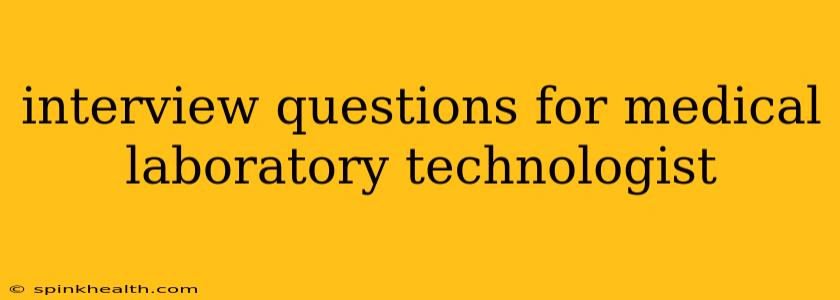Decoding the Lab: Essential Interview Questions for a Medical Laboratory Technologist
The whirring centrifuges, the precise pipetting, the meticulous analysis – the world of a medical laboratory technologist is one of quiet precision, yet its impact on patient care is monumental. Finding the right candidate requires more than just a checklist of qualifications; it demands a deep dive into their skills, experience, and passion for accuracy. This guide provides a curated selection of interview questions designed to uncover the ideal medical laboratory technologist, addressing both technical expertise and soft skills crucial for success.
I. Technical Proficiency & Experience:
1. Describe your experience with various laboratory techniques, including specific examples of your proficiency in hematology, clinical chemistry, microbiology, or immunology. (This open-ended question allows the candidate to showcase their breadth of knowledge and highlight areas of expertise. Listen for specific examples and quantifiable achievements, like improving turnaround time or reducing error rates.)
2. How do you ensure the accuracy and reliability of test results? Walk me through your quality control procedures. (This question probes their understanding of quality assurance and their commitment to meticulous work. Look for an understanding of both pre-analytical, analytical, and post-analytical phases of testing.)
3. Explain a time you encountered a challenging or unusual lab result. How did you approach the situation, and what was the outcome? (This assesses their problem-solving skills and ability to handle unexpected situations. A strong candidate will demonstrate critical thinking, methodical troubleshooting, and communication skills.)
4. Describe your experience with laboratory information systems (LIS). What are the key functionalities of an LIS that you find most beneficial, and how have you used them to improve efficiency? (This focuses on their familiarity with essential lab technology and their understanding of how technology contributes to workflow.)
II. Problem-Solving & Critical Thinking:
5. How do you handle high-pressure situations, such as during a surge in patient samples or when dealing with urgent requests? (Healthcare is often fast-paced and demanding. This question evaluates their ability to manage stress and prioritize tasks effectively.)
6. Imagine you discover a discrepancy between a patient's test results and their clinical presentation. How would you proceed? (This probes their analytical skills and their ability to collaborate with clinicians. The emphasis should be on their systematic approach and communication skills.)
III. Soft Skills & Teamwork:
7. Describe your experience working in a team environment. Provide specific examples of how you have contributed to teamwork and collaboration. (Laboratory work is rarely solitary. This assesses their interpersonal skills and ability to function effectively as part of a larger team.)
8. How do you communicate complex medical information to non-medical personnel, such as physicians or patients? (Effective communication is vital. This questions assesses their ability to tailor their communication style to different audiences.)
9. How do you stay updated on the latest advancements and best practices in medical laboratory technology? (Continuous learning is essential in this field. Look for engagement in professional development activities, continuing education courses, and professional organizations.)
IV. Additional Questions (Based on PAA and Specific Needs):
10. What are the common sources of pre-analytical errors in medical laboratory testing, and how can they be minimized? (This delves into a key aspect of quality control.)
11. How familiar are you with different types of laboratory equipment, such as automated analyzers, microscopes, and centrifuges? Describe your experience maintaining and troubleshooting such equipment. (This question gauges their practical skills and their understanding of equipment maintenance.)
12. What safety precautions do you typically follow when handling biological specimens and hazardous materials? (This focuses on their commitment to safe laboratory practices and adherence to regulations.)
By incorporating these questions and tailoring them to the specific needs and focus of your laboratory, you can effectively assess the candidate's qualifications and select the ideal individual to join your team. Remember to encourage thoughtful responses and allow the candidate ample time to articulate their experiences and perspectives.

